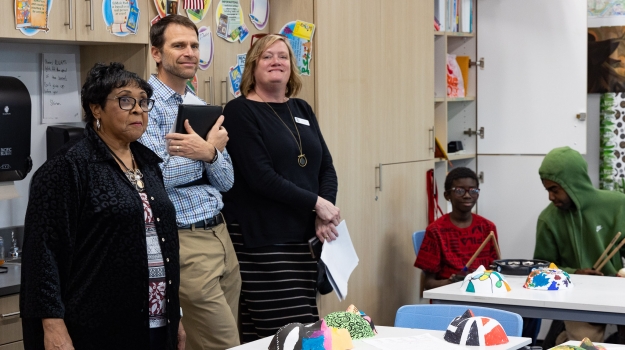One of the first pieces of public education to come to the chopping block is teacher assistants. Perhaps they seem like fluff to legislators and politicians? Maybe our elected officials see this position as one that can be replaced with a parent or other volunteer? Maybe it would help to look a bit more closely at the list of tasks they are expected to master on the job.
From the North Carolina Association of Teacher Assistants:
Work Performed by Teacher Assistants
- Assist individual students so the teacher can continue the whole-group lesson – Work with small groups or individuals to re-teach, practice, and reinforce skills previously introduced by the teacher.
- Review lesson plans with the teacher – Consult with the teacher to understand his/her goals and the teacher assistant’s role in supporting those goals.
- Teach children – Under the supervision of the teacher, work with individuals or small groups to build upon skills the student has previously mastered. Materials used include Reading Mastery, Corrective Reading, and Open Court for literacy and the textbook and manipulatives for math.
- Create materials to be used in the classroom – Make up word-search puzzles, comprehension questions for novel studies, word problems for math practice, and other items requested by the teacher.
- Utilize office equipment and clerical skills to support the teacher’s instructional goals – Make copies, cut and/or laminate, and assemble materials, create materials using Microsoft Works software, update students’ Accelerated Reader and Orchard records on the computer, set up and maintain classroom files, receipt money, correct papers, and record grades.
- Serve on School Committees – Teacher Assistants serve on committees and work with after-school clubs such as School Leadership Team, PTA, Faculty Advisory Committee, Chess Club, Chorus, Unicycle Club, Step Club, Odyssey of the Mind, Art Club, Literacy Club, Newspaper Club, Hospitality Committee, and fundraising projects.
- Morning and afternoon carpool duty – Ensure that students exit and load their vehicles and enter and exit the school safely. At some schools they direct traffic and serve as crossing guards.
- Monitor students – Assist younger students in making food selections and maintain appropriate student behavior in the cafeteria during breakfast and lunch. Escort students to recess, special area classes, and the cafeteria. Ensure students travel safely and manage behavior on field trips.
- Serve as proctors for Quarterly and End of Grade Testing.
- Participate in Staff Development – Teacher assistants continually take part in staff development offered by school systems, through college and university courses, and through workshops offered by the North Carolina Association of Teacher Assistants.
- Communicate with parents and serve as a positive liaison with the community – Support the goals of the teacher and the school by sharing information and/or initiating contact with parents when appropriate. In addition, teacher assistants are aware of their responsibility to be a positive role model at work as well as away from work. They also serve as advocates for our students in the community.
- Community Involvement – In addition to their work in the classroom, teacher assistants support the goals of the school’s character education initiative by the work they do in their communities. Many teacher assistants are involved in civic, religious, and neighborhood activities.
- Lisa Fisher, NCATA Newsletter Editor and 2006 Teacher Assistant of the Year
Reading this list points out to me that they are not simply “assistants to teachers” but they are “assisting in the teaching” of our youth. Sounds like a very important job! Sounds like something beyond what a parent or volunteer might do for a few hours a day and a few days a week. What do you think?


